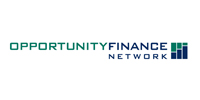
There is an organization and network many in finance ought to know about, if they don't already and if they want to know about financing programs that make a difference and have immediate impact in communities. The Opportunity Finance Network, with programs, activities and funding relationships all over the U.S., acts in the hub of all of community-development finance.
"Our mission," says Donna Fabiani, OFN's Executive Vice President for Knowledge Sharing, "is to bring the whole industry (of community development finance) to scale." OFN (http://www.opportunityfinancenetwork.net/) is membership-based and connects investors and lenders to financial institutions and funds that finance low-income and low-wealth communities.
Today 180 Community Development Financial Institutions (CDFIs) are members and beneficiaries of OFN. Over 900 CDFIs exist in the U.S., many with a certification from the U.S. Treasury, based on critieria. CDFIs may themselves be small banks or funds with direct ties to the low-wealth community. OFN acts as an adviser or facilitator to CDFIs, who are funded by investors/lenders and, in turn, lend directly into the community.
With OFN's guidance, those who invest or lend (to CDFIs) may include investment funds, venture funds, larger banks, and other lenders. Some are unregulated; some regulated. OFN's role assists investors who seek to engage in "socially responsible investing." The funds and banks lend to CDFIs or make investments in them. Or they may arrange co-investments with CDFIs. OFN, since its inceptions, has arranged over $23 billion in financings with CDFIs.
CDFIs, in turn, use the funds to make loans to small businesses, consumers, or non-profit organizations or make loans to facilitate housing and microfinance activity.
Many of the funds that invest in CDFIs are non-profit organizations with goals to boost economic development in certain areas. Others have other objectives: achieving a target return on investment, providing job opportunities and growth in designated geographies, or (in some cases with banks) seeking CRA-related ("Community Reinvestment") credit.
OFN also manages a CDFI fund to make investments and loans to CDFIs. Thus, investors contribute to the fund, which invests or lends directly to the CDFI. In some ways, Fabiani says, OFN is a "fund of funds."
OFN's role extends beyond arranging financing and acting as the go-between that pulls it all together. It also greases the wheels to keep all participants informed, updated, and aware of policy and economic issues. It sponsors an annual national conference on community development where participants (investors, funds, banks, CDFIs, policy-makers, economists, and others) meet to discuss current topics, issues, lessons learned, current, pending legislation, and knowledge sharing.
OFN administers its own ratings system (CDFI Assessment and Ratings System or "CARS") to help investors and lenders decide which CFDIs they may want to finance. The ratings offer not just a financial assessment of the CFDI, but a community-development-impact assessment. The ratings help investors/lenders in managing investment risks and in determining determine whether the investment meets social-responsibility objectives.
This year, OFN's 26th annual conference will take place in San Francisco November 2-5 and will be one of the largest gatherings in the U.S. on community development, bringing together hundreds of important participants, including lenders, investors, CDFIs, and government agencies. At this year's conference, Federal Reserve Bank-San Francisco president Janet Yellen will be a keynote speaker.
In other sessions at the conference, OFN will outline a 15-year community-development (or "opportunity finance") strategy. There will be programs focusing on green finance, consumer finance, risk management, housing finance and small-business finance. Seminars or events on selected topics will be scheduled: e.g., CDFI board management, loan participations, social media and online funding, the disabilities market, and managing delinquencies.
Consortium MBAs and CFN members (including students, alumni and supporters) interested in community-development finance, socially responsible investing, microfinance, small-business lending, and housing finance should consider attending. They get the chance to connect with participants from all facets of the industry and learn about career opportunities. They can learn more about the funds or organizations that invest or the institutions that lend directly into the community.
OFN sponsors smaller, regional conferences. They, too, focus on important industry topics or programs and efforts to increase knowledge in a special topic or provide invaluable updates. The next regional conference will be in December in Dallas.
OFN is not yet a Consortium sponsor, but is interested in establishing ties with the organization, Consortium schools, students and alumni by acting as a conduit to community-development finance.
Those interested in following up or learning more can explore the website or contact Fabiani at dfabiani@opportunityfinance.net.
Tracy Williams
No comments:
Post a Comment